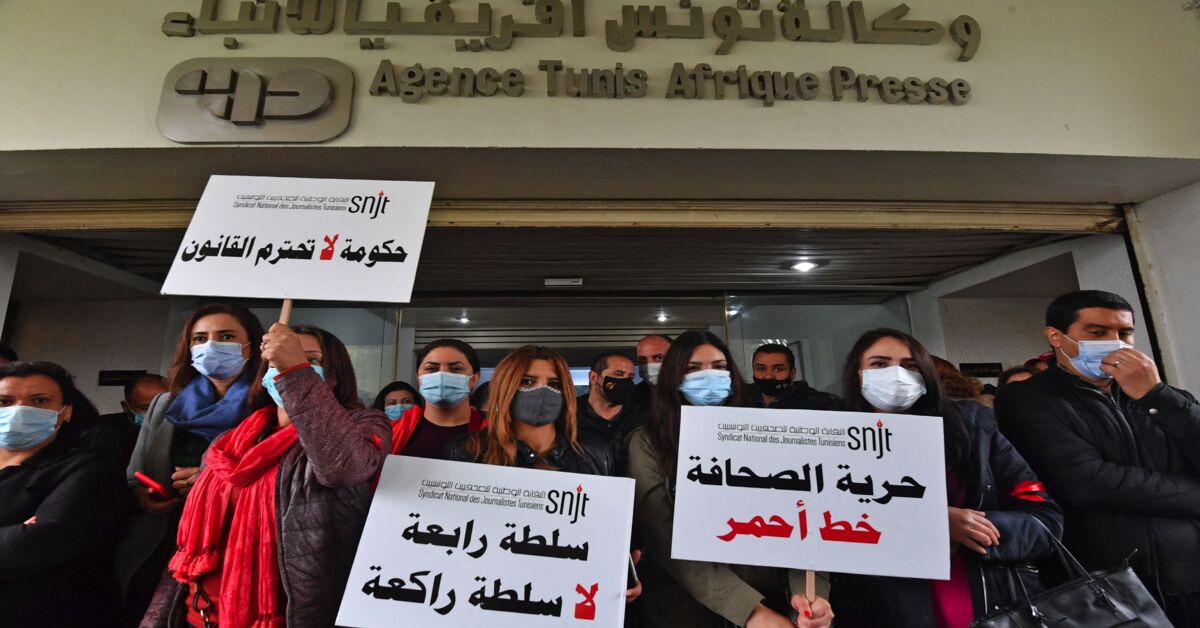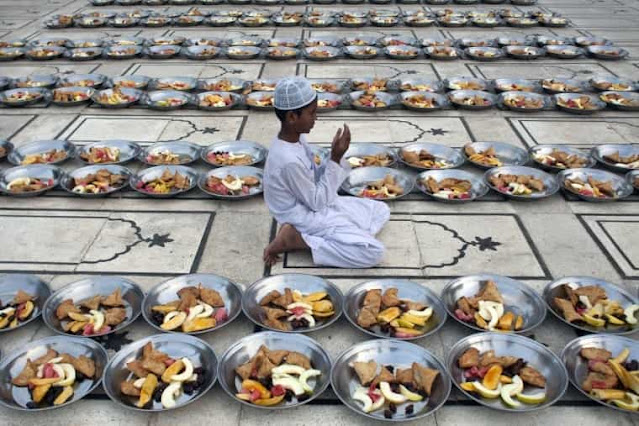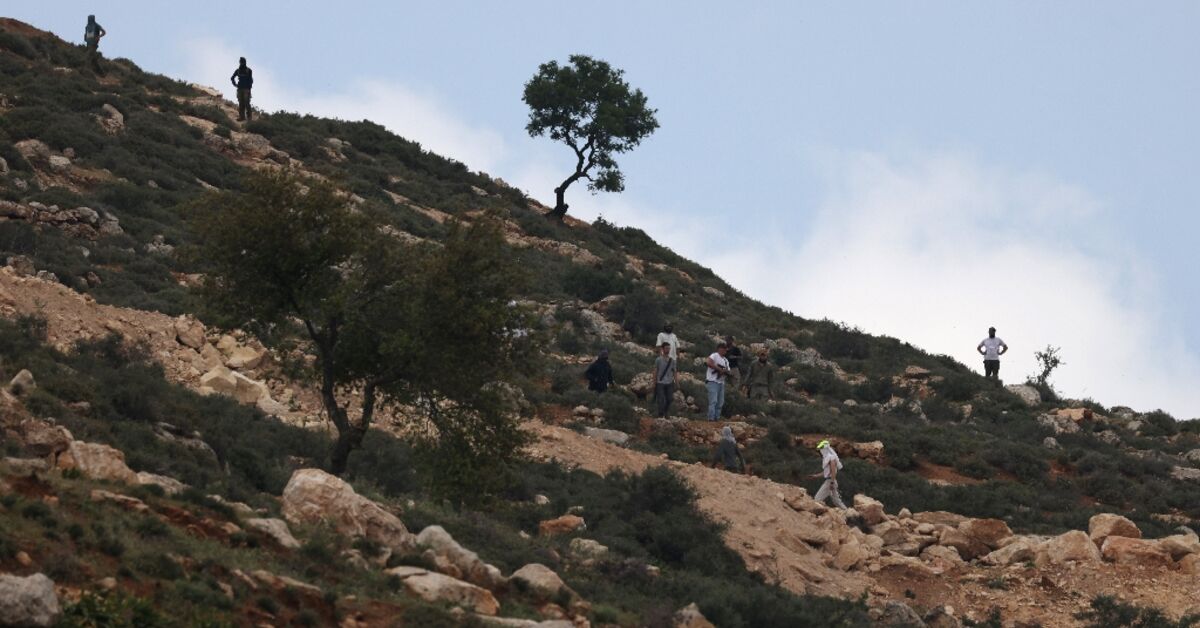
TUNIS — The Nationwide Syndicate of Tunisian Journalists confirmed in an announcement Oct. 6 its absolute rejection of army trials of civilians, journalists and activists primarily based on their positions, views and publications. This comes in opposition to the background of a heightened arrest marketing campaign of journalists and activists, most of whom oppose President Kais Saied who ousted the government and suspended parliament with assist from the military on July 25.
The syndicate warned in opposition to the return to freedom restrictions, and thought of these trials a setback for freedom of expression and a blow to democracy and the best to disagree.
On Oct. 5, the Tunisian judiciary sentenced 4 individuals to jail, together with a feminine journalist, on costs of spying and harming state safety via social media pages, elevating the anger of rights organizations that worry the return of tyranny.
The case of the 4 individuals has develop into recognized within the media because the “Instalingo case,” named after a Tunisian digital content material manufacturing firm accused of launching these social media pages.
Suhail Mudaimegh, a lawyer and member of the protection group for the suspects within the Instalingo case, told Mosaique private radio that the general public prosecution issued jail sentences in opposition to 4 individuals out of seven others who had beforehand been held in custody.
On Oct. 3, Tunisian authorities arrested parliament member Aloui Abdellatif and Ameur Ayed, host of the Hassad 24 tv program on Zaytouna TV, on costs of conspiring in opposition to state safety after they criticized and insulted Saied throughout an episode of the present.
Ramzi Afdhal, member of the manager workplace of the Nationwide Syndicate of Tunisian Journalists, informed Al-Monitor that referring journalists and civilians to army courts is an unconstitutional process and a adverse indication for the way forward for public freedoms within the nation.
Afdhal harassed the journalist syndicate’s whole rejection of prosecuting journalists and activists primarily based on their opinions and concepts.
“The syndicate believes that any skilled errors or publishing points are the prerogatives of the syndicate’s our bodies as per Decree 115/2011 on the Freedom of Press, Printing and Publishing. The syndicate additionally stresses its adherence to Decree-Legislation 115 and Decree-Legislation 116 on audiovisual media as the only framework for organizing the occupation,” he stated.
Fawziya al-Ghiloufi, one other member of the syndicates’ government workplace, stated in an Oct. 5 Fb submit that arresting journalists constitutes a critical menace to journalism in Tunisia. She added that the syndicate won’t stay silent on threats in opposition to journalists.
Tunisian authorities had additionally closed Al-Jazeera offices in Tunis on July 26, a day after Saied introduced a sequence of remarkable choices, beginning with the suspension of parliament and lifting immunity from parliament members, the sacking of the prime minister, in addition to his choice to snatch the manager energy with the assistance of a premier of his selection.
Tunisian blogger Salime Jebali was additionally summoned on Could 31 for investigation on the Army Public Prosecution on costs of defaming the president.
On June 17, the army judiciary sentenced Jebali to jail for 3 months with fast execution. He was launched on July 2.
Most political events and organizations denounced Saied’s distinctive measures, that are viewed as a coup in opposition to the Tunisian Structure.
The Attorneys for the Safety of Rights and Freedoms affiliation said in a statement Oct. 3 that ongoing trials of civilians earlier than army courts deepen fears of escalated crackdowns on everybody that opposes the president.
In an announcement issued Oct. 3, the left-wing Tunisian Staff’ Get together denounced what it described because the “treason campaigns” in opposition to these opposing the president’s choices, blaming him for any repercussions of those measures that undermine freedom of expression.
Additionally on Oct. 3, the Tunisia Will Motion denounced the safety authorities’ arrest of Abdellatif and Ayed for expressing their views, contemplating this step a critical violation of the legislation.
Hassib Abidi, vice chairman of the Tunisian Affiliation for Rights and Freedoms, informed Al-Monitor that media freedom is the one acquire that was achieved within the 2011 revolution that toppled Zine El Abidine Ben Ali’s regime, and any makes an attempt to limit the liberty should be confronted.
He stated referring journalists to army trials is a harmful indication of restriction of the liberty of opinion. “The pinnacle of state should abide by his pledges to protect public freedoms within the nation,” Abidi stated.
Since asserting the distinctive measures on July 25, Saied had pledged a number of occasions to protect the rights and freedoms stipulated within the 2014 Structure. However human rights organizations criticized him for his restrictions on journalists and for conducting army trials for civilians.
In line with a Nationwide Syndicate of Tunisian Journalists report launched on Could 3, which marked the World Press Freedom Day, 206 attacks were recorded against journalists from Could 1, 2020, to April 3, 2021, in Tunisia, which is the very best fee of assaults previously three years.
Additionally in keeping with the report, the Inside Ministry and the safety apparatuses carried out 43 assaults on journalists, and the Cupboard ranked second when it comes to political appointments in private and non-private media shops and in violent practices in opposition to journalists.



